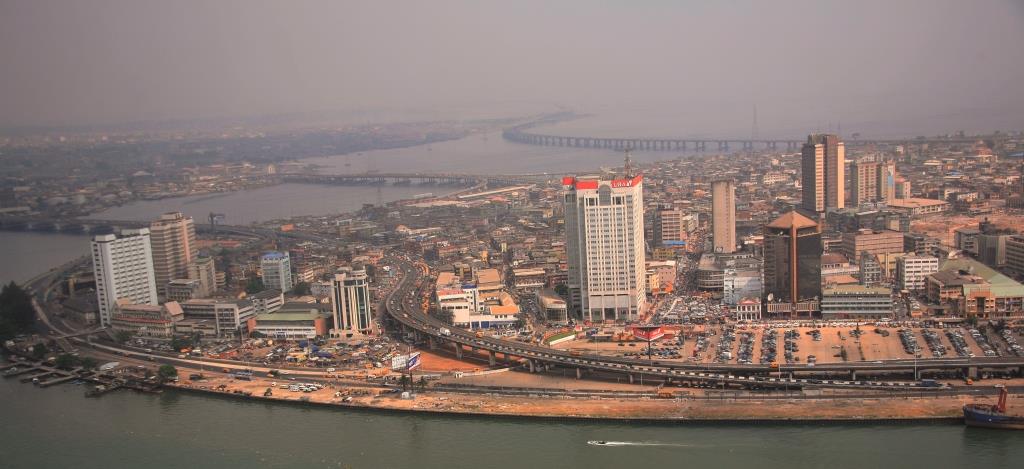Ganiyu “Tarzan” Balogun, managing director of Tarzan Marine Enterprises in Lagos, Nigeria, is not a poker player and he’s never taken big business risks. His success story is riddled with serendipity so that he now owns one of the oldest boat companies in Lagos. Tarzan was born in 1943 and spent most of his early childhood in Tarkwa Bay, close to Victoria Island. As a boy, he took a 15-minute boat trip to and from school. After completing his studies, he worked for the African Insurance Brokers Company (AIBC) as a driver. His father, then an engineer for the Nigerian army, was unhappy with Tarzan’s career choice and forbade him to continue working as a driver. It took an AIBC senior management official to convince the old man that it was in his son’s interests to work for them. Nine months later, AIBC bought Tarzan a boat.

Soon after acquiring the boat, Tarzan began ferrying passengers. He soon realized there was good money to be made from the waterways. A cargo ship about to dock, gave him an idea: the crew would make excellent tourists. Captains and crew rented his boat to go ashore and his bus to tour Lagos. “I used to take them to night clubs and wherever they wanted to go to have fun and take them back to their ship of around 11,” says Tarzan. He expanded his business. By 1990, he had opened his first boat yard in Eleke Crescent, home to 65% of Nigeria’s foreign embassies. Tarzan ferried diplomats visiting the country.
He later moved to Lekki Expressway where he still conducts his business. The old building on Ozumba Mbadiwe-Lekki Expressway waterfront is deceptive. It hides Tarzan’s success story. He carries 4,000 passengers a week. In a good month, this company could generate more than $50,000.
Tarzan has now been operating for 30 years. Many times, he could have given up. He tells an anecdote of the impact of government policies on his business. “I have been beaten so many times by the Nigerian army and police because I used to buy fuel with the 20-liter jerry can for my boat,” says Tarzan. The government had banned the sale of fuel in jerry cans to curb the practice of hording petrol and later selling it at a higher price. This, however, had unintended consequences for boat operators who relied on these cans to refuel their boats. Today, fuel stations have been built in Cross River State and Rivers State but they are still to be built in Lagos. Rather than close shop in the face of the challenges, Tarzan persevered.
Loading...
A tourism industry, which could help companies such as Tarzan’s expand, is still in its infancy. The industry suffered during the recent military and civilian governments. Despite the government’s declaration in 2002 that it intended to make tourism one of the six key areas for economic development, Nigeria is not a popular tourist destination. Countries such as Kenya, with its vast game reserve, have invested heavily in tourism making it one of the most popular tourist destinations in Africa. The West Africa sub-region has lagged behind attracting only 770,000 tourists representing 10% of the 2,6 million international tourist arrivals in 2009. Six of the 14 countries in the region recorded 100,000 international tourists. Paradoxically, Nigeria was ahead of the pack attracting 30% of the sub-regional market.

If waterways business in Lagos was a game of luck and timing for Tarzan, then for Soji Adeola, CEO of Salmon Multiservices, it was about risking it all. Despite the challenges in the industry, Adeola believes there is potential in Nigeria’s waterways. “A city the size of Lagos cannot survive on a single mode of transportation,” says Adeola. The population of Lagos is estimated to be 18 million and it’s growing at about 8%, which means that the city is growing faster than Los Angeles and New York. The World Bank predicts that Lagos will be the third largest city in the world after Tokyo and Mumbai by 2015.
This is why Adeola is betting on the waterways. While working as a banker, he bought a boat. After completing his MBA studies in 2009, he resigned and focused his efforts on his new company. He operates two boats that ferry corporate officials in the Marina-Apapa Channel. He believes there is potential for his “emerging company”. “As of today, we had 1,4 million Lagos residents using the waterways each month. This is projected to increase to 4 million and perhaps, a lot more than that,” says the optimistic Adeola.
Adeola sees his company as being strategically positioned to provide water transport solutions and meet leisure challenges in Nigeria’s coastal areas. He is proposing a $100 million plan to the Lagos State government to build jetties around Lagos. There are about 60 jetties in the city so far, but these would be insufficient should the market reach the projected 4 million.
Currently, the world’s biggest hotel operators are the only serious investors in Lagos’ waterfronts. The Oriental, Four Points, Peninsula Resort and Radisson Blu hotels got in early to line the picturesque Ozumba Mbadiwe-Lekki Expressway waterfront.
For investors looking for returns, your next trip should be to Lagos–there is plenty of opportunity in the waterways.
Loading...
